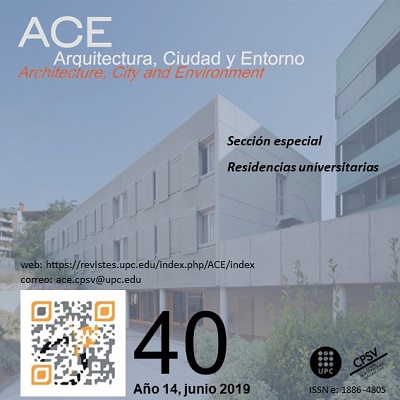Scholarships and grants for university residences. The scholarship policy as a fundamental piece for the university mobility project
DOI:
https://doi.org/10.5821/ace.14.40.6768Keywords:
university residence, grants, scholarships, EurostudentAbstract
Objective
The objective of this article is to study the policy of scholarships and grants for Spanish university residences. This policy is not only a fundamental piece for the university mobility project, promoted by the EU, but also a necessary condition to facilitate university access for young people from families with more economic difficulties.
Methodology
The methodology used has been a comparative analysis of the policies followed in the 2008-2011 period with those followed in 2017.
Conclusions
Currently 71% of students do not change their address when they enter the university. Of the rest, 68% share a flat. If the evolution of housing aids is analysed, during the period between those two dates, it is found that aid has decreased by 46% on that period, practically half.
The reason for this considerable reduction is above all in the introduction of the variable "academic performance", which has conditioned the constraints on economic aid and hardened the contribution of better qualifications. It is not the object of this article to debate on this issue, based on criteria of equity for study aids. The change that has been brought, confuses the policies of equity and of helping the most disadvantaged with the policies rewarding and incentivizing the best prepared.
The data of recent years on scholarships for accommodation show us that these are insufficient. The number of students displaced from their places of habitual residence who enjoy mobility aids is 22.6%. Unfortunately, a large number of this group that does not have these scholarships.
Originality
The originality of the article is to denounce that the change of the policy of scholarships and housing aids has worsen students’ conditions. Also, the proposal of an alternative system of aid in kind will help sustain the system of residences and colleges, without undermining the final destination of student help. The campus has to change, to open and become a part of the city, breaking its exclusivity as a teaching institution, incorporating and increasing not only its attractiveness for research, but also for other economic activities related to transfer of knowledge and university accommodation. Both as an indivisible part of campus activities: Social Spaces and Didactic Campus.
Downloads
Published
Issue
Section
License
| INTELECTUAL PROTECTION CRITERIA |
At this moment, it is count with the "Oficina Española de Patentes y Marcas", while global protection it is being processed by the World Intelectual Property Organization (OMPI/WIPO). Nevertheless the International Standard Serial Number Office (ISSN) has given the following numbers ISSN: 1886-4805 (electronic version) and 1887-7052 (paper version). All articles will be peer reviewed, using double blind reviewing. |
| COPYRIGHT |
The article contents and their comments are authors exclusive liability, and do not reflect necessarily the journal editor commitee's opinion. All ACE published works are subject to the following licence CC BY-NC-ND 3.0 ES http://creativecommons.org/licenses/by-nc-nd/3.0/es/ It implies that authors do not hold nor retain the copyright without restrictions but only those included in the licence. |





































